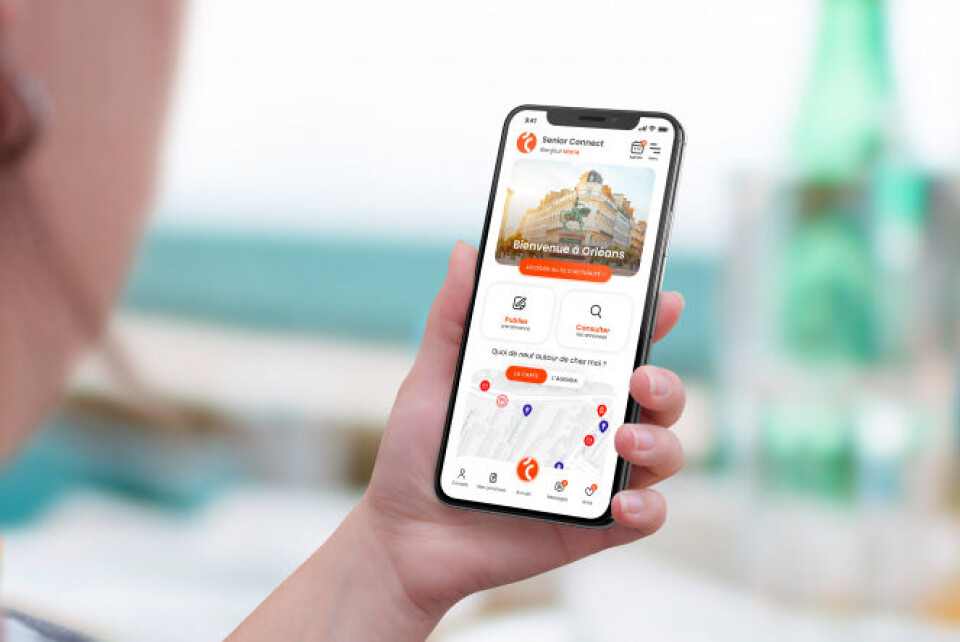-
Digital ID to be accepted at French airports this summer
Scheme not open to non-French residents despite plans to include certain card holders by the end of 2025
-
AI usage on the rise in France but lags behind UK and US
Uptick in generative AI usage outpaces smartphone and internet adoption across similar timeframe
-
Poor-quality fibre internet installations remain an issue in France
Stricter measures are announced to improve connection quality
French towns offer free app to boost social links for over-55s
The app lets older people find events in their area, and connect with others who share the same hobbies, in a bid to combat social isolation

An app that aims to reduce social isolation and encourage links between people aged over 55 is now available in several areas of France.
Users can find out the latest news in their area, consult a map of events aimed at their age group, and post and respond to messages requesting help or proposing an activity.
Julien Champain, who created the Senior Connect app with a business partner in 2021, said: “There’s a list of posts, a newsfeed, a calendar, an interactive map, and the possibility of exchanging messages and that’s it. We don’t have ambitions of becoming the Facebook for seniors. The more complicated an app is, the more it excludes people.”

He cited a woman in Orléans offering cooking classes to small groups of people as an example of how the app can bring people together.
Senior Connect replaced a previous app, launched in 2017, which allowed local authorities to communicate with this age group.
“In 2017, most towns offered memory workshops or meals for older people, but nothing overly positive.
“And when people talked about technology for older people, it was often in the context of dependency and disability. But many people are in great shape at 65 and they just want to help out or share an activity.”
“Isolation is one thing but you can be in a couple at 70 and still not know anybody you can play cards with.”
Read more: Alarm as number of isolated and lonely over-60s in France doubles
To benefit, you must aged at least 55 (60 in some areas) – an age group referred to as seniors in French – and live in a town or department that has signed up to the system.
App free and no adverts
The app is free for users and there are no adverts.
“Seniors in France hate adverts. They are the most solicited people in the country: my grandfather would get sent 40 flyers a day.”
No money is exchanged via the app, either.
This is partly to reassure those who are less familiar with technology and can be reticent.
If, for example, somebody decides to buy tickets to an event for a group in advance, the payment will take place offline.
So that users are certain never to be asked for their bank details, the app is not available via the App Store or Google Play, but is accessible via smartphone, tablet or computer at seniorconnect.fr.
Video calls can be made from within it, allowing users to see each other and build trust before meeting.
Local authorities bear the cost
Local authorities bear the cost, which depends on their size – €10,000 per year for a town of 50,000 inhabitants, or €48,000 for a department such as Sarthe in Pays de la Loire, for example – meaning it is not available everywhere.
Users must have an address in a town or department using the app and enter their date of birth.
The project was born in Normandy, where Mr Champain is a local councillor in the town of Cabourg.
The app is available in the following towns: Caen, Dozulé and Mondeville (Calvados); Tourcoing (Nord); Oyonnax (Ain); Cherbourg-en-cotentin (Manche); Orléans (Loiret); and Soyaux (Charente). Toulouse is in the process of rolling it out for residents.
Two departments have also implemented the app across their entire area: Sarthe and Rhône.
While they are happy to work with all local authorities, Mr Champain says they are focusing on convincing larger towns and whole departments.
“There is more solidarity between residents in the countryside than in an apartment building.
We were struck to see that the need for social links is much greater in Caen or Orléans than in rural areas.”
There is also likely to be more activity on the app in densely populated areas.
Jean-François Pichon, director of the Centre communal d’action sociale (CCAS) in Tourcoing, which launched the app in December 2021 under the name Tempo Connect, said: “The example is ‘I’m going away for two days, who can walk my dog?’.
Or ‘I’m feeling lonely, does anybody want to come and play cards?’.”
A little more than a year later, it has 400 regular users, most of whom are aged 65 to 75, with the oldest in their nineties.
“Between 20% and 25% of seniors no longer have any family ties,” said Mr Pichon.
75% of age group previously downloaded an app
Technology is increasingly seen as a solution, with 75% of this age group having previously downloaded an application.
The France Services help centres have been promoting the app and helping people learn how to use it.
Mr Pichon admits: “Some time is needed to convince users, as it can appear tiresome to have to create a profile at the beginning.”
In Tourcoing, as a result of feedback from residents, the local business guide, featuring offers from 180 partners, is also integrated into the app, making it possible to locate deals using the interactive map.
It is also much easier for the CCAS to reach residents this way, compared to using the print magazine it publishes four times a year.
Rosina Fragale, head of senior activities at the CCAS, said: “Before, if we had last-minute tickets for a show or exhibition, we didn’t necessarily have a way of communicating with seniors. Here, we can publish a listing for a visit within the hour.”
She said most of the users’ posts are for organising things such as walks and cultural activities, rather than services.
“We’re not going to use it to replace an activity which could also be economic.”
Social isolation is something the CCAS has identified.
“It’s a real problem, on a national level. Even seniors we don’t consider to be isolated can have children or grandchildren who work Monday to Friday, and so they only have visitors at the weekend.”
Related articles
Should older drivers in France face medical tests to stay on the road?
Why are so many people in France living to 100 now?
Language-learners call retired French people to practise chatting
























